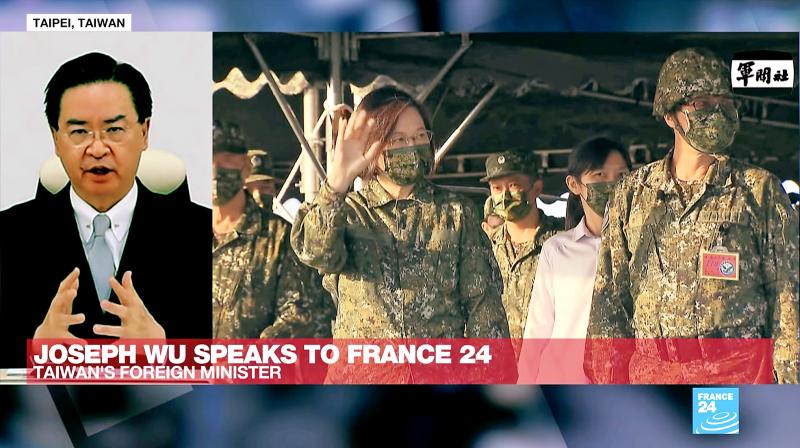The threat from China is “very serious,” Minister of Foreign Affairs Joseph Wu (吳釗燮) warned in an interview with French television on Friday.
“If you look at the level of their military exercises around Taiwan, either in the air or on the surface, or their missile capabilities, [the Chinese military] is being improved tremendously in the [past] few years,” Wu said during an interview with France24. “They also openly talked about invading Taiwan.”
Last year alone, there were more than 900 sorties by Chinese military aircraft, which is threatening to Taiwanese, he said.

Photo copied by Yang Cheng-yu, Taipei Times
“We just have to be prepared, whether they are going to attack Taiwan next year, in two years or in 10 years,” whether it is an all-out invasion or a military skirmish within Taiwan’s territory, he said.
Asked if the US would go to war with China to defend Taiwan, Wu said that “it is a question for the US to consider whether Taiwan is valuable enough for them to intervene.”
“We have the responsibility of defending ourselves. What we are asking for from the United States is that it continues to live up to its commitments under the Taiwan Relations Act,” he said.
The act stipulates that the US is committed to providing Taiwan with sufficient defensive armaments and helping Taiwan with military training, he added.
The US is working hard in this regard, while the level of Taiwan-US cooperation has been increasing, ranging from information exchanges, arms sales, personnel training and guidance on modernizing Taiwan’s reservist forces, Wu said.
Many foreign leaders and high-ranking officials have expressed concerns about security across the Taiwan Strait on more than 20 occasions, showing that maintaining peace and stability across the Strait has become a consensus of the international community, he said.
In other news, the Ministry of Foreign Affairs yesterday condemned China for impeding Taiwanese officers’ participation in the Washington-based Naval Attaches Association, a non-governmental organization that serves as a platform for navy officers from different countries to interact.
The association rescinded an invitation for Taiwan to join the organization after China’s strong objections, although it last summer agreed to a membership request from the Taipei Economic and Cultural Representative Office in the US, the Financial Times reported on Friday.
The office appealed to the US Department of State for support, but was told that the US government could not help because the association is a private organization, the newspaper reported, citing officials in Taipei.
The incident again exposes China’s authoritarianism and its inclination to use coercive means to intervene in the operations of foreign non-governmental organizations, the ministry said in a statement.
Taiwanese diplomats in the US would continue to promote bilateral partnerships, it said, thanking the state department and the US Navy for lending moral support to Taiwan and assisting its efforts.
Taiwan has the right and is willing to participate in international affairs and deepen relations with different countries, it added.
The nation would continue to enhance official and unofficial relations with like-minded partners to defend freedom, democracy and human rights, it said.

Chinese Nationalist Party (KMT) Chairman Eric Chu (朱立倫), spokeswoman Yang Chih-yu (楊智伃) and Legislator Hsieh Lung-chieh (謝龍介) would be summoned by police for questioning for leading an illegal assembly on Thursday evening last week, Minister of the Interior Liu Shyh-fang (劉世芳) said today. The three KMT officials led an assembly outside the Taipei City Prosecutors’ Office, a restricted area where public assembly is not allowed, protesting the questioning of several KMT staff and searches of KMT headquarters and offices in a recall petition forgery case. Chu, Yang and Hsieh are all suspected of contravening the Assembly and Parade Act (集會遊行法) by holding

PRAISE: Japanese visitor Takashi Kubota said the Taiwanese temple architecture images showcased in the AI Art Gallery were the most impressive displays he saw Taiwan does not have an official pavilion at the World Expo in Osaka, Japan, because of its diplomatic predicament, but the government-backed Tech World pavilion is drawing interest with its unique recreations of works by Taiwanese artists. The pavilion features an artificial intelligence (AI)-based art gallery showcasing works of famous Taiwanese artists from the Japanese colonial period using innovative technologies. Among its main simulated displays are Eastern gouache paintings by Chen Chin (陳進), Lin Yu-shan (林玉山) and Kuo Hsueh-hu (郭雪湖), who were the three young Taiwanese painters selected for the East Asian Painting exhibition in 1927. Gouache is a water-based

Taiwan would welcome the return of Honduras as a diplomatic ally if its next president decides to make such a move, Minister of Foreign Affairs Lin Chia-lung (林佳龍) said yesterday. “Of course, we would welcome Honduras if they want to restore diplomatic ties with Taiwan after their elections,” Lin said at a meeting of the legislature’s Foreign Affairs and National Defense Committee, when asked to comment on statements made by two of the three Honduran presidential candidates during the presidential campaign in the Central American country. Taiwan is paying close attention to the region as a whole in the wake of a

OFF-TARGET: More than 30,000 participants were expected to take part in the Games next month, but only 6,550 foreign and 19,400 Taiwanese athletes have registered Taipei city councilors yesterday blasted the organizers of next month’s World Masters Games over sudden timetable and venue changes, which they said have caused thousands of participants to back out of the international sporting event, among other organizational issues. They also cited visa delays and political interference by China as reasons many foreign athletes are requesting refunds for the event, to be held from May 17 to 30. Jointly organized by the Taipei and New Taipei City governments, the games have been rocked by numerous controversies since preparations began in 2020. Taipei City Councilor Lin Yen-feng (林延鳳) said yesterday that new measures by